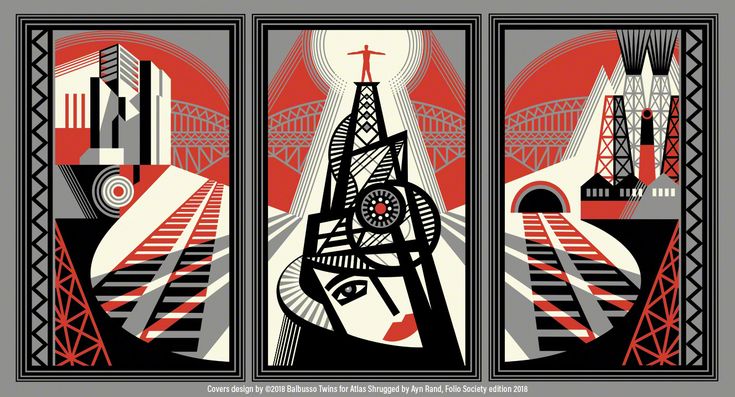
Atlas Shrugged and the Pursuit of Objectivism: Inside Ayn Rand's Philosophy

In the game of Bioshock, an important question is asked: Is a man not entitled to the sweat of his brow? “‘No!' says the man in Washington, 'It belongs to the poor.' 'No!' says the man in the Vatican, 'It belongs to God.' 'No!' says the man in Moscow, 'It belongs to everyone.’” And then, Andrew Ryan continues: “I rejected those answers; instead, I chose something different. I chose the impossible. I chose... Rapture, a city where the artist would not fear the censor, where the scientist would not be bound by petty morality, Where the great would not be constrained by the small! And with the sweat of your brow, Rapture can become your city as well.” From this point, you can say “Wow, Rapture seems good, there is no bound that applies to the creators!”, but the issue is that, when you enter the Rapture, it’s totally demolished. It is genuinely relevant when you understand that the dream of Andrew Ryan, the Rapture, occurred from the controversial philosophy of Ayn Rand; Objectivism.
What is objectivism, you might be asking. Objectivist philosophy, which is detaily explained in Rand’s questionable book Atlas Shrugged, mainly consists of self-interest and individualism. As a person whose family fled from the Soviet Union, Ayn Rand allocates her philosophy upon a place where every human being should have “advanced” individualism because innovation rises upon the inventive people who are the main “brains” of humankind and these people are the ones who develop the world. Atlas Shrugged is “a story about human beings in action”, as Rand claims. According to Rand, there are two classes within society who are always in conflict: looters and innovators. Looters are the supporters of high taxation, government spending/planning, and regulations. Politicians, their supporters, bureaucrats, liberal businessmen who are afraid of competition, scientists who sell their minds to bureaucrats, etc. are part of the looters in society. Innovators, on the other hand, are the thinkers, the doers. They are competent and daring individualists who innovate, develop, and create new inventions. These actors are dedicated to achieving the impossible through their thoughts and efforts because they think the unthinkable and are motivated to make this impossible. This is why Henry, a.k.a. Hank, Rearden invented a new alloy; he was one of the “innovators” of society. People like Hank Rearden or Dwight Sanders have a unique ingenuity that makes them “the innovators”, and Rand believes they should be obeyed since with their great minds and great abilities, the innovators will develop our world and make the unbreakable. The conflict is, thus, between innovators who profit through competition and productive ability; and looters who earn by force and profit through political power which only gains through abusement of innovators.
Atlas Shrugged is the story of the struggle between two classes; productors and non-productors, or looters and innovators which are the names aforementioned. The story takes place in a slightly moderated and dystopian United States where government interference in the economy has led to widespread economic collapse and the decline of society. The country has a head of state rather than a president and a National Legislature instead of a Congress. This is something that Ayn Rand is doing often. In the book Anthem, she tells the story of a dystopia where human beings are not allowed to say ‘I’ and the world is led by collectivism and radical socialism. Atlas Shrugged’s universe and actually all of Ayn Rand universes are simultaneously anachronistic and timeless which is telling the stories of collectivist dystopias. It tells a story of an industrialist and a journalist who is researching his story. The plot is built around several business and industrial executives. The protagonist of the tale is the stunning Dagny Taggart, whose grandfather established the Taggart Transcontinental Railroad and who is arguably the most heroic female protagonist in American fiction. Her liberal, indecisive brother James, who is merely the president in name, claims all the glory for his sister's accomplishments. Despite devastating government rules, her brother's flaws, the stupidity of many of her partners, and the silent and mysterious disappearance of society's capable businessmen, Dagny cheerfully and confidently undertakes Herculean labors to keep the railroad operating.
The question of “Who is John Galt?” is another cornerstone of the story. The innovators often ask themselves “Who is John Galt?”. Before searching for the sub-meanings of the question, let’s try to answer the obvious one. Who is John Galt? John Galt is an engineer (like most of the innovators in the story), philosopher, and inventor. He created a motor that transforms static electricity into practical, affordable kinetic energy. He does, however, decide to conceal his creation until it is time for him and the other heroes to retake the Earth. Galt doesn't appear for more than two-thirds of the book; he only asks, "Who is John Galt?" He has been recruiting the strikers while he has been in hiding and working as a laborer in the Taggart Tunnels. Galt believes in the rights of individuals to use their minds solely by themselves. When he first appeared in the third novel, he started his monologue with these words: “For twelve years, you have been asking: Who is John Galt? This is John Galt speaking. I am the man who loves his life. I am the man who does not sacrifice his love or his values. I am the man who has deprived you of victims and thus has destroyed your world, and if you wish to know why you are perishing—you who dread knowledge—I am the man who will now tell you.” Then, Galt states several key critiques for pages which also include the climax of the story and the core points of the whole book. The significance of individualism and the worth of useful people in society is Galt's monologue's main theme. According to Galt, everyone has the right to pursue their own pleasure, but they can only do so in a community that values and promotes individual success. The monologue's emphasis on the value of reason as a guiding force in human affairs is another major theme. According to Galt, in a society that prizes individual achievement, reason must be maintained and promoted because it is the only tool for comprehending reality and attaining one's goals. Galt criticizes collectivism and socialism as well, contending that they are founded on the idea that people exist for the good of society or the state rather than the other way around. He contends that these ideologies are intrinsically faulty and cause society as a whole to stagnate while oppressing and destroying productive people.
John Galt may be considered as the messiah of this story; a messiah of free enterprise and at the catastrophic point of the story, a secret influencer of thinkers and doers to vanish mysteriously one after the other, deserting and sometimes sabotaging their factories before they depart. Galt demonstrates how cruelly the world treats industrious people despite how much it needs them with the strike he shaped. The consequences an individual faces in the form of rules, controls, and the expropriation and redistribution of his earned income increase with their level of productive capacity. The achievers have consented to the political robbery of the creations of their minds by embracing an undeserved guilt, not for their vices but for their virtues. Galt designs his strategy to stop the world's engine by persuading a number of the world's titans of intellect and productivity to strike by withholding their talents from the world and fleeing to a hidden location in the Colorado Rockies, leaving the welfare state to self-destruct. Once the foundation for a sound new social order based on laissez-faire capitalism has been established, the hero-conspirators will reappear.
The importance of Atlas Shrugged and Objectivism lies in its role of defending individualism and capitalism, meanwhile criticizing collectivism. In contrast to being limited by the needs of the state or society, the novel depicts a world in which people are free to pursue their own happiness and succeed through their own efforts. It contends that acknowledging and defending individual rights and liberties is the only way to bring about human prosperity and advancement. Libertarians, conservatives, and proponents of laissez-faire capitalism have all been affected by Atlas Shrugged and other writings by Ayn Rand, such as The Fountainhead or Anthem. Additionally, it has generated debate and criticism, with some claiming that its focus on individualism and self-interest can result in a lack of concern for other people's well-being and a disrespect for social duty. It still has an impact on political and philosophical discussion. Its topics and concepts continue to stimulate conversation about the individual's place in society and the characteristics of human flourishing. The core theme of Atlas Shrugged is still one of the main discourses in American Politics, with the debates on the healthcare system.
When Margaret Thatcher said "There is no such thing as society, there are only individuals. And there are families.", she echoed Ayn Rand's belief in the primacy of individualism and personal responsibility, which is a central theme in Rand's philosophy of Objectivism as exemplified in her novel Atlas Shrugged. Both women believed in the power of the individual to shape their own destiny and the importance of personal achievement and success as opposed to collective action or dependence on others. After all of that, this is the story of idealists who are daring. These two idealist women, with two idealist men, Friedrich August von Hayek and Ronald Reagan, built and shaped the neo-liberal world from the 1970s to today. Even though neo-liberalism is so far away from what Rand wanted, Ayn Rand's novel Atlas Shrugged presents her philosophy of Objectivism in a captivating and thought-provoking way, challenging readers to question their own beliefs and values while contemplating the nature of individualism, reason, and the pursuit of happiness. Her philosophy affected neoliberalism, the current world, as well as shaping and dominating the new world order, while we are asking the question; Who is John Galt anyway?



